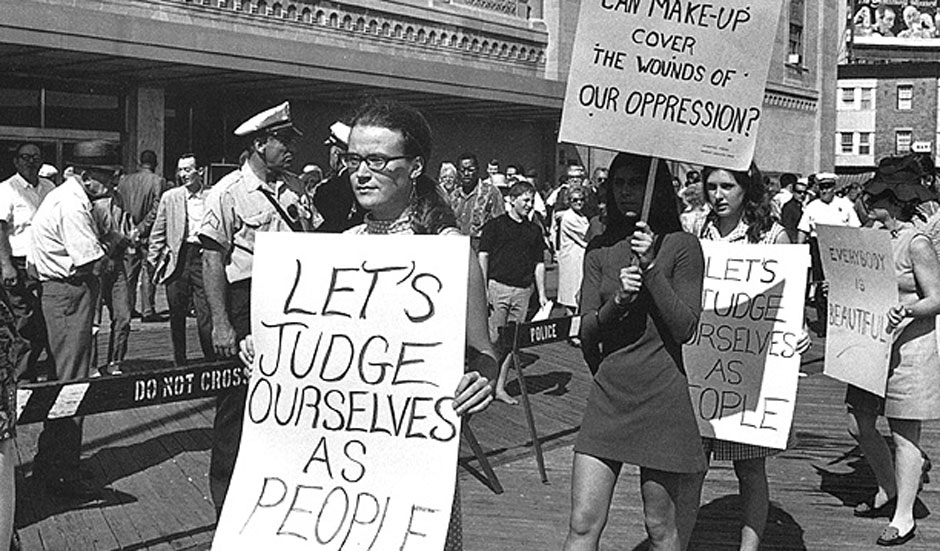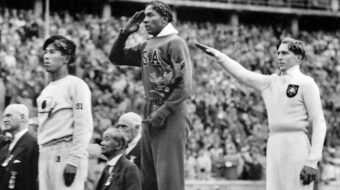
Fifty years ago, on September 7, 1968, protestors made history with their militant opposition to the Miss America contest in Atlantic City, N.J.
The demonstration was attended by about 400 feminists, and separately by civil rights advocates. The feminist protest, organized by New York Radical Women, included tossing a collection of symbolic feminine products—pots, mops, false eyelashes, copies of Cosmopolitan and Playboy magazines, high-heeled shoes, curlers, hairspray, makeup, girdles, corsets and other items—into a “Freedom Trash Can” on the Atlantic City boardwalk.
When the protesters unfurled a large banner emblazoned with “Women’s Liberation” inside the contest hall, they drew worldwide media attention and national focus to the movement.
Reporter Lindsy Van Gelder drew an analogy in her New York Post reporting between the feminist protesters tossing bras in the trash cans and Vietnam War protesters who burned their draft cards. The headline read, “Bra Burners and Miss America.” There was no bra-burning, but that misrepresentation came to be permanently attached to the event and became an antagonistic catch-phrase of the feminist era.
Another protest took place on the same day, organized by civil rights activist J. Morriss Anderson. At the Ritz Carlton Hotel a few blocks from the Miss America pageant, they crowned the first Miss Black America.
New York Radical Women was a group of individuals who had been active in the civil rights movement, the New Left, and antiwar movements. It was organized in 1967 by former TV child star Robin Morgan, Carol Hanisch, Shulamith Firestone, and Pam Allen. Searching for a suitable way to draw attention to their movement, they chose the Miss America pageant as a way of criticizing how beauty standards oppress all women.
The feminists protested what they called, “The Degrading Mindless-Boob-Girlie Symbol” and American society’s normative beauty expectations. As huge crowds gathered, they marched, passed out pamphlets, and crowned a live sheep—comparing the beauty pageant to livestock competitions at county fairs.
Since its inception in 1921, only Caucasian contestants had been accepted as Miss America pageant finalists, so the demonstrators accused the contest as “Racism with Roses.” They also criticized the “cheerleader” tour taken by the winner to visit troops in foreign countries (the Vietnam War was at its height) symbolizing “Miss America as Military Death Mascot.” Her support of the troops personifies the “unstained patriotic American womanhood our boys are fighting for.”
The issues Robin Morgan articulated in the pamphlet “No More Miss America!” anticipated numerous problems women would have to overcome in their battle for equality.
Some in an earlier generation of feminists called for burning corsets as a step toward liberation. In 1873 Elizabeth Stuart Phelps Ward wrote: “Burn up the corsets!… No, nor do you save the whalebones, you will never need whalebones again. Make a bonfire of the cruel steels that have lorded it over your thorax and abdomens for so many years and heave a sigh of relief, for your emancipation I assure you, from this moment has begun.”
In the inevitable backlash, some critics of feminism latched onto the false “bra-burning” myth to say that women weren’t really seeking freedom from sexism, but were attempting to assert themselves as sexual beings, merely trying to be “trendy, and to attract men.” Feminists countered that anti-feminists used the subject of going braless to trivialize what the protesters and the feminist movement in general were trying to accomplish.
The first Miss Black America, a few blocks away from the pageant, was 19-year-old Philadelphia native Saundra Williams, who had been active on the civil rights scene prior to the competition. As a college student, she had helped organize the Black Awareness Movement with her classmates and staged a sit-in at a local restaurant which refused to serve African Americans. In her acceptance speech, she stated that Black America needed to be reminded that Black people are also beautiful. This choice stood in sharp contrast to the standards at the white pageant.
Protester and organizer Robin Morgan said, “We deplore Miss Black America as much as Miss White America but we understand the black issue involved.”
Source: Wikipedia.












Comments